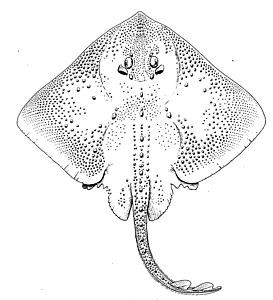Project AWARE Urges Canada, EU, and US to Secure a Reduction in NAFO Thorny Skate Catch Limit

As the annual meeting of Northwest Atlantic Fisheries Organizations (NAFO) begins today in Halifax, Nova Scotia, Project AWARE, Shark Advocates International, and other like-minded NGOs have asked for science based catch limits on threatened thorny skates.
In 2004, in a major accomplishment, NAFO set the world’s first Regional Fishery Management Organization “total allowable catch” (TAC) for a shark or ray fishery but the future of this legacy is in question. In order for TAC to be effective in rebuilding shark or ray population, it must be in line with scientific advice.
The main species in the NAFO skate fishery is the thorny skate and the current TAC is much higher than what the NAFO scientific council recommends.
“We have urged NAFO members to work to secure a reduction in thorny skate total allowable catch (TAC) from 12,000 metric tons to no more than the level recommended by the NAFO Scientific Council (5,000 tons)” comments Sonja Fordham, Shark Advocates International President who is attending the NAFO meeting as a conservation community representative on the United States government delegation.
In joint letters, submitted separately, to Canada, EU, and US NAFO representatives, we’ve shared and addressed our concerns about the status and management of thorny skate.
Thorny skate is classified by the IUCN as Vulnerable globally and Critically Endangered off the U.S. east coast.
Given that Spain and Canada are major players in the NAFO thorny skate fishery, and given US leadership in securing the first TAC in 2004, each of these NAFO members not only plays a key role in TAC negotiations but more importantly, has a responsibility to work to ensure sustainable fisheries for this vulnerable species.
In Project AWARE’s two core efforts: securing CITES protections and strengthening the EU finning ban, we emphasize the importance of adhering to scientific advice in fisheries management. It is also integral to Canada’s and US stated approach to fisheries management, to the European Community Plan of Action for Sharks, and finally Article 4 of the Commission’s proposal for the reform of the Common Fisheries Policy.



